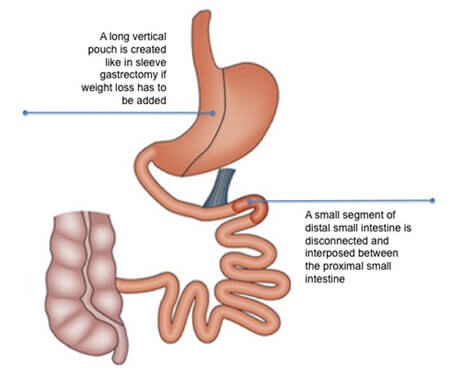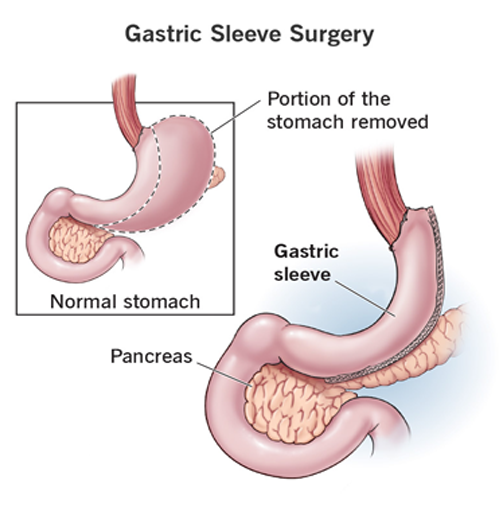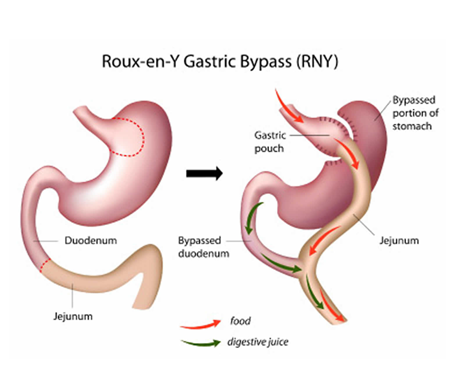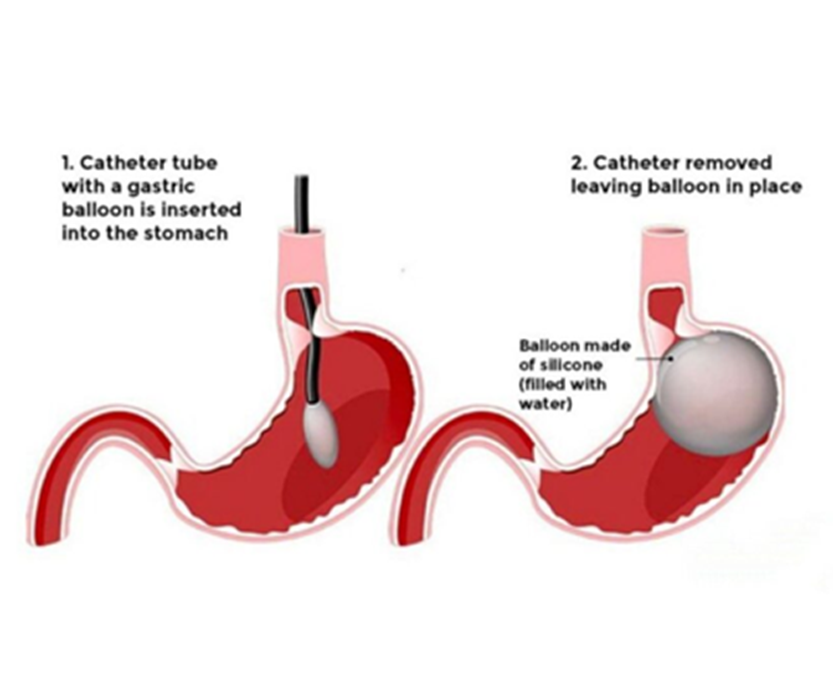What is Bariatric Surgery ?
Bariatric surgery, commonly referred to as weight loss surgery, encompasses surgical interventions designed to aid individuals with obesity in shedding excess weight.
It becomes a consideration when conventional weight loss methods prove ineffective and when obesity poses significant health threats.
These procedures involve altering the digestive system, primarily the stomach and occasionally the small intestine, to control calorie intake and absorption while curbing hunger signals to the brain.
They serve not only to address obesity but also to manage and prevent metabolic diseases such as diabetes, blood pressure, cholesterol levels and fatty liver disease.

Why Undergo Bariatric Surgery ?
Bariatric surgery stands out as the most effective long-term treatment for class III obesity.
Traditional weight loss approaches often fall short due to the body’s tendency to resist sustained weight reduction efforts once a higher weight becomes the norm. By modifying the body’s response to food intake, bariatric surgery paves the way for enduring weight loss and improved health outcomes.
What kind of conditions can bariatric surgery treat ?
Obesity is linked with various chronic diseases and risk factors, many of which substantially improve post-surgery. These include:
- High Cholesterol
- Hypertension
- Diabetes
- Heart Disease
- Kidney Disease
- Obstructive Sleep Apnea
- Osteoarthritis
- Non-Alcoholic Fatty Liver Disease.
What qualifies you for bariatric surgery ?
- Body Mass Index (BMI) of 40 or higher, or
- Have a BMI of at least 35 and at least one related health problem.
What’s involved in preparation for bariatric surgery ?
Before scheduling your bariatric surgery, Dr. Damani will want to ensure that you’re physically and mentally fit for the surgery. You’ll meet with a team of specialists who will counsel you about the risks and benefits while evaluating your physical and mental health.
You may need to pass medical screening tests to make sure the surgery is safe for you. If you use tobacco, drugs or excessive alcohol, you’ll be required to quit before qualifying for surgery. Our team can help you with this.
Dr. Damani may also ask you to follow a pre-bariatric surgery diet for a few weeks to prepare for your operation. This is to reduce the fat inside your abdomen, where the operation will take place, making the operation safer and reducing the risk of complications.
Some Common Types of Bariatric Surgery :
1 Sleeve Gastrectomy
Sleeve gastrectomy, also called “the vertical sleeve” or “the sleeve,” involves removing about two-thirds or up to 80% the left side of the stomach, leaving a banana-shaped sleeve or smaller stomach. This restricts the amount of food you can eat at one time, helping you feel full faster. It also produces positive changes in hormones that suppress hunger, reduce appetite and improve satiety (or the feeling of being full).
As with other bariatric surgeries, sleeve gastrectomy can provide more benefits than just weight loss, such as lower blood pressure and cholesterol, improvement or even resolution of Type 2 diabetes, less joint pain, more energy and better sleep. It also can reduce the risk of other weight-related health problems such as cancer, heart disease and stroke.
With sleeve gastrectomy, the smaller stomach and resulting changes in hormones can facilitate rapid and significant weight loss. Although each patient is different, many patients see long-term success with this type of surgery.


2 Gastric Bypass
Gastric bypass (RYGB) involves several steps. First, the upper portion of the stomach is stapled to create a small pouch. As with sleeve gastrectomy, this restricts the amount of food you can eat at one time and produces positive changes in gut hormones that reduce appetite and enhance satiety (the feeling of being full).
The next step is dividing the first part of the small intestine into a Y shape. One arm of the Y attaches to the smaller stomach pouch so that food will bypass a portion of the small intestine where calories are absorbed. The other arm is attached to the lower, unused portion of the stomach so that digestive juices re-join the food in a lower section of the small intestine.
3 Intragastric Balloon Procedure
An intragastric balloon is a non-surgical option for qualified patients. This procedure is typically used to help individuals starting a diet-and-exercise regimen who want assistance controlling their hunger and limiting their food intake. It can also help patients lose weight before surgery to reduce their risk of complications. The intragastric balloon is a soft, expandable silicone balloon inserted during an outpatient visit. After a patient is mildly sedated, a deflated balloon is inserted through the mouth and down the esophagus into the stomach. Once in place, the balloon is slowly inflated with saline through a tube. This creates a sense of fullness and restricts the amount of food you can eat at one time.
The balloon is a short-term solution and can be left in place for six months. Patients who combine a medically supervised diet and exercise program with the balloon tend to experience and maintain more weight loss.

What kind of postoperative care will I have after weight loss surgery ?
Recovery from bariatric surgery involves a gradual return to normal activities, with initial weeks focusing on rest and dietary adjustments. Long-term success hinges on ongoing medical follow-ups and lifestyle modifications to support weight maintenance and overall health.
During the first year after your surgery, Dr. Damani will see you regularly for follow-up visits and testing. Metabolic blood tests will be done to monitor how your health is improving and screen for any nutritional deficiencies.
After the first year, if you’re in good health and have lost a lot of weight, you may want to discuss body contouring options with us. Body contouring can help remove excess skin folds and tighten loose tissues.
How much weight do you lose with bariatric surgery ?
Most people lose about 50% of their excess weight after bariatric surgery, and keep it off. Different procedures have slightly different results. The average weight loss after gastric bypass is about 70% of excess body weight.
Weight loss after sleeve gastrectomy ranges between 30% and 80%. These results are measured after a period of 18 to 24 months.
What are the Risks and Benefits of Bariatric Surgery ?
While bariatric surgery carries inherent risks, including surgical complications and digestive side effects, the benefits outweigh the potential drawbacks.
Surgery, combined with exercise, healthy eating, and social support, allows patients to lose a significant amount of weight and maintain that loss. But, there are many other benefits beyond weight loss.
- Alleviating high cholesterol : Fatty deposits in your blood vessels caused by high cholesterol hinder blood flow and can lead to cardiovascular disease, high blood pressure, diabetes, heart attack or stroke. But losing as little as 5 kg’s can improve your cholesterol levels.
- Reducing depression : Obesity affects your mood, but depression also can lead to less exercise, cravings for high-carb food and a slower metabolism. It’s a vicious cycle, but weight-loss surgery has been known to decrease depression symptoms by as much as 55%.
- Ending sleep Apnea : Untreated, sleep apnea contributes to hypertension, stroke, heart failure, diabetes, obesity and heart attacks. However, up to 98% of bariatric patients experience a reversal of sleep apnea.
- Reversing Hypertension : High blood pressure damages arteries and decreases blood flow and oxygen to the heart. In addition, it can lead to heart attack, stroke, heart failure, metabolic syndrome, aneurysm and dementia. Weight-loss surgery, however, has been known to reverse the condition in as many as 63% of people, according to the American Heart Association.
- Improving fertility : Studies indicate that in the first year post surgery, men experience an increase in testosterone, sperm viability and sperm volume. Women experienced a reversal of polycystic ovary syndrome symptoms (PCOS), and the average pregnancy rate for previously infertile PCOS patients post bariatric surgery was 73%.
- A longer, healthier life : Studies, including a 2020 report in JAMA, found weight loss surgery patients outlived people of similar age, sex, and (initial) BMI who had not undergone surgery. It can reduce all-cause mortality by up to 40% compared to patients who chose not to undergo a weight-loss procedure.
- Reversing type 2 diabetes : Type 2 diabetes and obesity exponentially increase your risk of depression, blindness, skin conditions, sleep apnea, hearing loss and other diseases. However, up to 83% of weight-loss surgery patients experience a reversal in the disease.
- Improving arthritis : Losing weight means less pressure on your joints and decreased pain, stiffness and swelling. Up to 76% of patients report improvement in arthritis symptoms and mobility, which can mean reduced need for medication.
